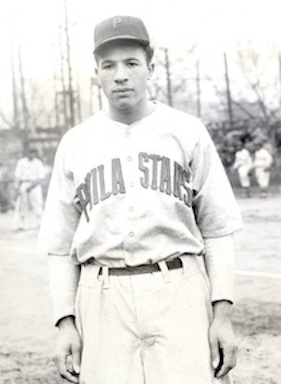
Sport: Baseball
Born: September 29, 1924
Died: November 9, 2012
Town: Gouldtown, New Jersey
Harold Lorenzo Gould was born September 29, 1924 in Gouldtown, then a century-old African-American community bordering Bridgeton in Cumberland County. As Harold’s family name suggests, the Goulds had roots in the area dating back to the early 1800s.
Semipro baseball provided a social hub for Gouldtown and Harold served as batboy for the Gouldtown Frogs as a boy. One of the stars of the frogs was John Borican, who would go on to become a world-class track & field star.
Strong, fast and coordinated himself, Harold excelled at Bridgeton High School as a pitcher and track & field athlete. He learned the welding trade, which served him well when American went to war in the 1940s. Harold worked in the shipyards at Camden and around New York City and made good money. He was in Times Square when the war ended in 1945.
Harold picked up extra cash during the early 1940s pitching for semipro teams and, at 21, had earned a reputation as a future star. He returned to South Jersey after the war and played for integrated teams, attracting the attention of the Philadelphia A’s and St. Louis Browns, who sent representatives to sign him. Integration in the bog leagues was still a couple of years away, so the scouts had to call back and deliver the bad news to their bosses that Harold was black—that piece of information apparently eluded the clubs when they received their assignments.
In 1946, Harold was signed by the Philadelphia Stars. He played for the team over parts of three seasons, winning a total of 19 times in Negro League and non-League games, losing just four contests. His roommate for much of that time was Harry Simpson, who was later signed by the Indians and became an All-Star with the Kansas City Athletics. In 1948 and 1949, Harold played ball in Canada, sometimes under the name of Lawrence Morgan. Also in 1949, he was the starting pitcher in an exhibition game to open Pop Lloyd Field in Atlantic City. He recalled it as one of the great honors in his career.
Harold hoped to follow Simpson and other African-American players to the big leagues, but that opportunity disappeared after he was drafted in 1950. Harold spent two-plus years in the army during the Korean War, where he starred for camp teams and played against future major leaguers, including Vern Law and Willie Mays.
Harold made a nice living as a contract welder and was still playing ball in and around Bridgeton in the early 1960s. He opened up his own welding shop in 1964. The business was successful enough that he was able to breed and train racehorses. Harold also became a crack golfer.
Although well known to baseball fans in South Jersey, Harold went largely unrecognized until the 1980s, when the Phillies began an annual event honoring the surviving players of the Philadelphia Stars. In 1994, he was enshrined in the New Jersey Hall of Fame.
Harold served for many years on the Board of Directors for the Negro League Baseball Players Association, along with fellow New Jerseyan Max Manning. Harold passed away at the age of 88 in 2012, in the town where he was born.